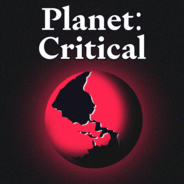What makes humans special?Nothing. But a small band of us in the Western hemisphere have inculcated ourselves over thousands of years to believe in our supremacy over the natural world. Christine Webb, primatologist at Harvard University, argues this unique arrogance is at the root of our ecological crisis in her forthcoming book, The Arrogant Ape.This is a fascinating conversation, with Christine revealing how almost all of the characteristics which we human beings have claimed distinguished ourselves from our kinfolk have eventually been found in other species. Perhaps most importantly, she explains how this culture of arrogance is learned by young children somewhere around the age of 4, who before that do not discriminate between humans and other species, meaning we could very swiftly learn to enjoy the kind of relationship with the more-than-human world that seems to come naturally to us. Although, of course, it would bring all of industrialised modernity tumbling down…Planet: Critical investigates why the world is in crisis. Join subscribers from 186 countries to support independent journalism. Get full access to Planet: Critical at www.planetcritical.com/subscribe

PolitikWirtschaftTalk
Planet: Critical Folgen
Planet: Critical is the podcast for a world in crisis. We face severe climate, energy, economic and political breakdown. Journalist Rachel Donald interviews those confronting the crisis, revealing what's really going on—and what needs to be done. www.planetcritical.com
Folgen von Planet: Critical
231 Folgen
-
Folge vom 26.06.2025Human Exceptionalism | Christine Webb
-
Folge vom 19.06.2025Why We Can't Understand Each Other | Damien WilliamsThere’s more information than ever — but we can’t agree on what it means.We think of language as a tool of communication. But it’s so much more than that. Language builds worlds and shapes realities; language is how we make sense of what we experience, and that sense-making is always done in partnership with each other. Language is the mechanism by which we develop shared understandings of reality. So why can’t we seem to find common ground with each other? Damien Williams is an assistant professor of philosophy and data science, and he joins me to tackle that question, explaining we live in a world of “bespoke realities” whereby people’s lived experiences are seemingly so different they cannot even come to a mutual understanding of the parts that are objective — like science. He explains why other people’s realities feel threatening, and offers key insight as to how we can build bridges with those who disagree with us. Damien and I only began to scratch the surface of this complex and critical topic. If you’d like to see this conversation continued as a roundtable with more interlocutors, please leave a comment below! Planet: Critical is 100% independent and community-powered. If you value it, and have the means, become a paid subscriber today. Get full access to Planet: Critical at www.planetcritical.com/subscribe
-
Folge vom 12.06.2025How to Change People's Minds | Sarah Stein LubranoDon’t Talk About Politics!That’s the title of neuroscientist and political theorist Sarah Stein Lubrano’s first book. A phenomenal and heavily researched foray into why debate is a useless form of political communication, why citizens of the Western world are particularly prone to disbelieving their neighbour’s lived experience, and the strategies which do work when on the campaign trail, Don’t Talk About Politics explains why the very art of conversation is breaking down with our political systems—and what to do about it.Sarah explains all this and more on the episode, explaining how our brains are atrophying along with our communities, the reason activists score happier than their peers on psychological tests, and how to begin growing the roots of a new political system on our very streets. We discuss her research in the context of the phenomenal community building and resistance movements I documented for Planet: Coordinate across Colombia and Ecuador, adding the lens of inter-relationality as a resource which remains much more available elsewhere. I interviewed Sarah in 2023 when she was deep in research mode for the book so it was a pleasure to have her come back on and reveal her findings, strategies and own lived experience of how to talk about politics—successfully—in the 21st century. Planet: Critical investigates why the world is in crisis. Join subscribers from 186 countries to support independent journalism. Get full access to Planet: Critical at www.planetcritical.com/subscribe
-
Folge vom 05.06.2025Change is Risk | Celine SemaanThe status quo won’t survive. Neither will we if we’re not willing to change. In this phenomenal conversation with powerhouse Celine Semaan, an artist, author and cofounder of Slow Factory, we explore why change is understandably terrifying—and why it’s now or never that we do it. In this wide-ranging and nuanced discussion we explore the big picture, colonialism, why systems are slow-moving, and the emotional load of confronting what’s happening. Celine reveals why most climate organisations are failing and how Slow Factory has set themselves apart by designing with risk at the centre. Slow Factory is a fascinating organisation which produces open source educational courses, information and comms for other NGOs in the space. We I discuss their agile model which has helped them break out in the climate space, and how they are now looking to transition to a more on-the-ground approach to community organising. Planet: Critical investigates why the world is in crisis. Join subscribers from 186 countries to support independent journalism. Get full access to Planet: Critical at www.planetcritical.com/subscribe
